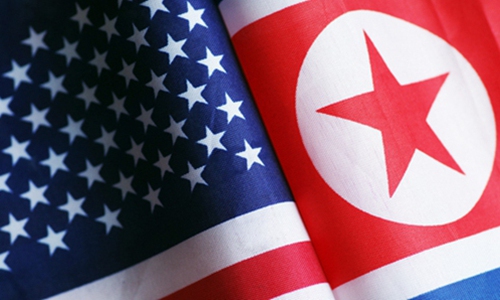HOME >> OPINION
US stance vital to breaking peninsula logjam
By Lü Chao Source:Global Times Published: 2020/1/5 16:42:02

Photo: IC
For the first time since assuming office, North Korean leader Kim Jong-un skipped the New Year address Wednesday. Instead, a speech he delivered at the Fifth Plenary Meeting of the Seventh Central Committee of the Workers' Party of Korea (WPK) was broadcast by state television on the first day of 2020, which is being seen by the global community as a year that could lay down new dynamics in relations between Pyongyang and Washington as US faces presidential election.The four-day WPK meeting concluded on the last day of 2019. In the plenary, the highlights of previous New Year speeches - reviewing the past, analyzing the present, and organizing future tasks - have already been addressed. Hence there is no need to make another speech. This change would not give rise to any misunderstanding inside the country.
The just-concluded ruling party plenary was convened amid rising tensions with Washington after the breakdown of nuclear talks.
In his speech, Kim made it clear that if Washington insists on a hostile policy toward Pyongyang, there "will never" be denuclearization on the Korean Peninsula. He added that "the world will witness a new strategic weapon" to be possessed by North Korea in the near future.
His statement has sent significant messages to the US: Pyongyang demands negotiations on a reciprocal basis. The two sides should act in a phased and synchronized fashion. If Washington always treats Pyongyang whimsically and forces it to make concessions, North Korea will refuse to settle differences through talks.
North Korea's tough attitude reflects policy adjustment. As Kim said in his speech, the country will prepare "offensive political, diplomatic and military countermeasures for firmly preserving the sovereignty and security of the country."
This adjustment in no way suggests that North Korea will start a military conflict with the US. The country is only changing its stance from defensive to offensive and from passive to active.
However, the US posture remains the key in current relations. Washington's moves will determine whether peace on the Korean Peninsula can be sustained.
At this stage, US attitude toward North Korea is full of contradictions. We can see the aggressive stance of some US military officials, but also softer ones of certain politicians calling for further talks with North Korea.
Washington needs to show sincerity. If the so-called talks are merely repetitions of past ones, Pyongyang will not buy it. The two sides have already raised major concerns at the Singapore summit in June 2018. The US should follow the joint statement the two countries issued, rather than letting its acts belie its words. In late December, US spy planes flew reconnaissance missions and monitored North Korea, which is not conducive to better ties.
North Korea has never shut the door to negotiations with the US. There is still room for peace talks. It is hoped that Washington can shift its tough stance and accept Pyongyang's offer.
In addition, the North Korea-US relationship is not simply a bilateral one, but involves the interests of various countries. It concerns the peace and stability in Northeast Asia, and may even affect the development of the continent and the world. As a result, the denuclearization of the Korean Peninsula is the common aspiration of several countries.
All stakeholders, including China, should keep urging Pyongyang and Washington to resolve disputes through negotiations and not to raise tensions through violence and deterrence. If the situation spirals out of control, related countries will take measures.
In easing tensions on the Korean Peninsula, China's role as a mediator is universally recognized. During critical times, China has always brought the US and North Korea back to talks. When Washington applied maximum pressure on Pyongyang, China always warned the US against such a move.
In particular, China and Russia on December 16 called on the UN Security Council to lift some sanctions on North Korea, a concrete measure reflecting China's deep concern over the Korean Peninsula. The resolution also appealed for "prompt resumption of the Six-Party Talks or re-launch of multilateral consultations in any other similar format." The international community should attach importance to such a constructive proposal.
The author is a research fellow at the Liaoning Academy of Social Sciences. opinion@globaltimes.com.cn
Posted in: ASIAN REVIEW